Having a good grasp of your marketing efforts' effect on revenue can seem difficult. Data related to marketing often isn't quantifiable in terms of dollars: Think brand awareness, brand perception, brand image...
Not to mention, you have customers who've stared at your Facebook ad for a month before going directly to your website, and customers who've read your company blog for years before checking out your product.
And yet, you can't carry on launching marketing campaigns, creating content, paying your social media manager... just because it feels all that is affecting sales in some positive way.
You need data that tells you what's working and what isn't.
That's where marketing analytics tools come into play. Dozens of analytics tools are on the market right now, and the demand for them is still growing. Probably because there is no perfect tool that will solve all of your marketing analytics issues.
The 10 tools highlighted in this article sufficiently perform various kinds of analytics so that you can figure out whether a given marketing tactic is working.
Read on to see which of them might help you make your marketing more data-driven.
Social Media
Social media isn't about the number of your followers on Facebook and Twitter. But social can offer a facsimile of measurement for those hazy goals that companies sometimes pursue, such as brand awareness and brand sentiment.
Most campaigns and product launches are reflected on social media. Hence, by counting mentions of a brand, a product, or a company, and looking at other related metrics, marketers can usually say whether campaigns were successful. And that is why many analytics tools are focused specifically on social media.
1. Awario
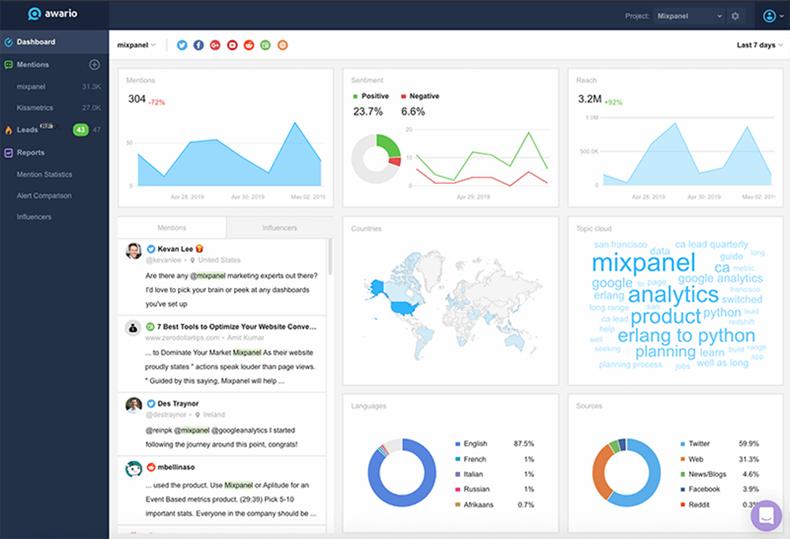
Awario is a social media monitoring tool (built by my company) that gathers mentions of a brand, company, product, or any other keyword, from social media channels, as well as from the news, blogs, forums, and the Web in general.
It analyzes mentions' growth over time, their reach, their sentiment (positive, negative, or neutral), the topics discussed most often alongside the brand, the social media market share of a given brand against its competitors, as well as the languages, locations, and Internet sources of information that brand customers and potential brand customers use.
Price: Awario offers a free 14-day trial. Paid plans start at $29 per month.
2. Keyhole
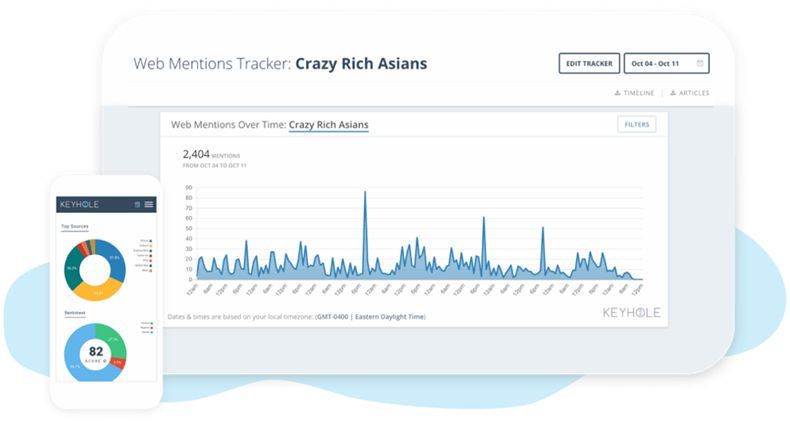
Keyhole is another social media monitoring tool that gathers mentions of a given keyword on social media, the news, and the larger Web. It provides growth metrics and sentiment score, and shows engagement level, hashtag trends, and mentions' reach. All those metrics together give you a good idea of how your brand is performing in terms of popularity online.
To find out more about your customers, the tool gives you insights into their demographics, locations, and languages.
Price: Keyhole offers a free seven-day trial. Paid plans start at $199 per month.
3. Sortender
Sortender shows where the conversations about your brand occur (covering Twitter, Facebook, Instagram, and YouTube), analyzing content performance and your audiences' engagement level.
You can do the same kind of analysis for your competitors, making it easy for you to see whether your brand is in line with or performing better than its competitors, and where it needs improvement.
The tool also offers tips on how to increase your brand's results based on the analysis.
Price: Sortender offers a free 14-day trial. Paid plans start at $50 per month.
Content Marketing
For many businesses, content marketing is key for driving traffic. Creating content that brings traffic isn't an easy task, however. You've got to figure out what type of content works best for your target audience, as well which topics and what voice resonate best. Content analytics tools can help you figure all that out.
4. BuzzSumo
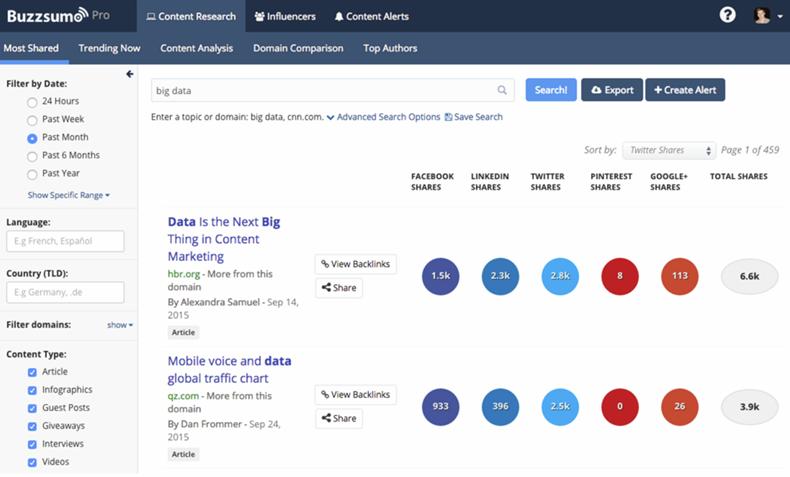
BuzzSumo lets you know which content performs best on social media and on the web for both you and your competitors. The tool also has a question analyzer that helps you create content based on the most frequently asked questions in your niche.
Price: there's a free basic plan. Paid plans start at $79 per month.
Marketing Automation and Management
Marketing automation platforms provide analytics as one of their many functions. These platforms are more complicated and more expensive marketing technologies than most. According to reviews on G2crowd, the following two receive high ratings from customers.
5. HubSpot
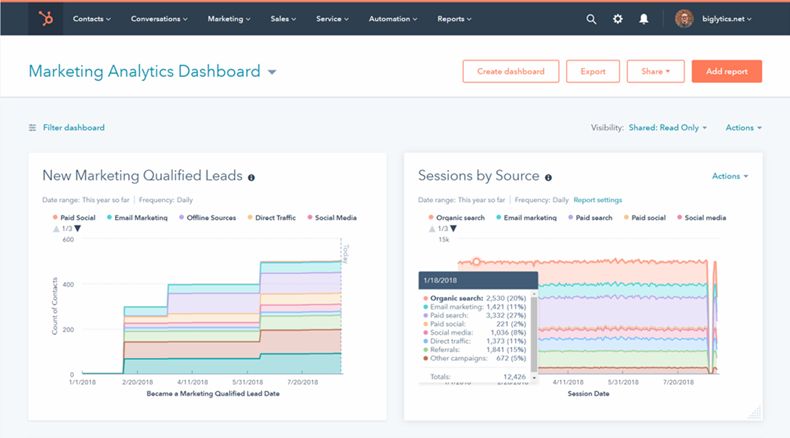
HubSpot is inbound marketing, sales, and service software. It brings major marketing efforts together in one place, where you can create everything marketing-related, including landing pages, blog posts, emails, and social media ads.
Its analytics features lets you track the customer lifecycle, from anonymous visitor to a closed sale. It shows key metrics that let you analyze website performance, including the quantity and quality of the traffic to your website. You can filter your analytics by country or URL structure. You also see email performance and social media ads performance without leaving the platform.
Price: HubSpot has some free tools and a Starter plan that starts at $50 per month. However, all analytics features come only with Professional and Enterprise plans that start at $800 per month.
6. Marketo
Marketo is another comprehensive marketing platform. It focuses on customer engagement marketing and marketing automation management. The tool identifies channels and campaigns that deliver the highest ROI, measures key performances across marketing stages (landing page performance, lead performance, campaign performance, etc.), and measures ad spend and ROI. All reporting is highly flexible, offering you to see the data in every which way.
Price: available upon request.
All-in-One Marketing Analytics
Finally, there are analytics tools that perform only marketing analysis, but they do it from start to finish. Here are the ones customers are most satisfied with, according to G2crowd reviews.
7. Looker
Looker is a business intelligence software that's all about data. It is integrated with any SQL database or data warehouse to allow you to connect to multiple databases and maintain multi-Cloud data environments.
The tool lets you connect all data sources that you have and derive one comprehensive picture of your business. Great visualizations and dashboards help you to comprehend all the information the tool provides.
Price: available upon request.
8. OWOX BI
This is a marketing analytics tool that shows you an AI-powered forecast of your marketing plan performance, and it produces actionable reports that say which channels are effective, which efforts affect sales, and which ones are draining the budget. It combines the data from website, CRM, and advertising services into a single database. Ad campaigns, cohort analysis, ROPO, CPA, ROI, ROAS, LTV, ???, attribution—everything is covered.
Price: OWOX BI offers a 14-day free trial. The basic plan starts at $115 per month.
9. Mixpanel
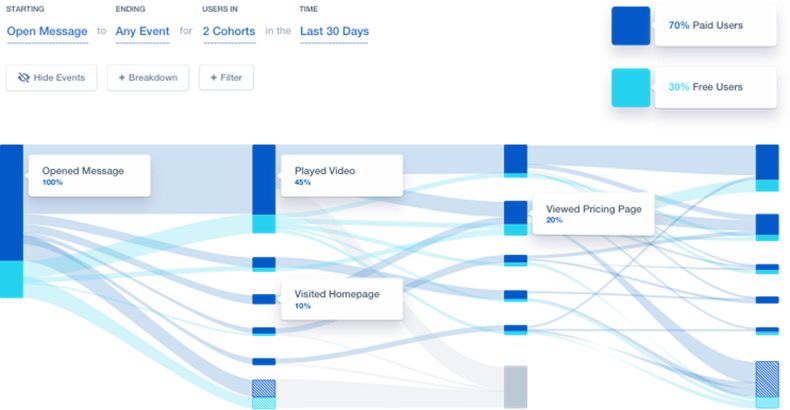
Mixpanel is a marketing analytics platform for apps. It measures the actions taken by people who enter your app, including user engagement and customer retention, analysis of pain points (at what point does a potential customer drop off) and other user behavior. In short, the data can give you a clear idea about what to do so customers keep buying.
Price: There's a free option that allows you to track up to 1,000 monthly users. Paid plans start at $779 per year.
10. DemandJump
DemandJump is a tool that lets you see what people do before they came to your website, the websites they visit, and the searches they conduct along their path to purchase. The tool also helps with competitive analysis: You can see where your competitors are showing up, what's driving their traffic, the ads they use, and how you compare. Finally, DemandJump gives automatic recommendations for what you should do next. It shows you the biggest gaps and opportunities for traffic growth, content, search, and media spend.
Price: available upon request.
Over to You...
The choice of marketing analytics tools is diverse and extensive. It's up to you to decide which parts of your marketing strategy are more in need of detailed evaluation and which ones can live and prosper with Google Analytics alone.
Choosing an analytics tool that fits your company isn't easy. It may take time to figure out how the more advanced among them work, and it will definitely take some part of your marketing budget. So decide on your goals, weigh up the potential benefits of an analytics tool, and try some of them out before making a purchase decision.




